It is imperative that steps are taken to “climate-proof” society, Prof John Sweeney told an audience of 80+ people at a climate justice event we co-hosted with Raphoe Justice and Peace Group in Letterkenny Regional Centre on 13th February.
Among those in attendance were Councillor John Campbell, Cathaoirleach of Donegal County Council, Councillor Ian McGarvey, and Rev Peter Murray, President of the Methodist Church in Ireland.
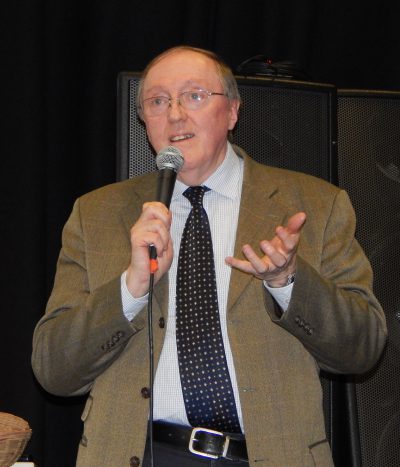 Prof Sweeney of NUI Maynooth said the clock was ticking when it came to climate change: “We should be taking the responsibility of tackling the issue of climate change seriously,” he said. “We have to climate change-proof society for the years ahead …. It won’t cost the earth to do it; it will cost the earth not to do it.”
Prof Sweeney of NUI Maynooth said the clock was ticking when it came to climate change: “We should be taking the responsibility of tackling the issue of climate change seriously,” he said. “We have to climate change-proof society for the years ahead …. It won’t cost the earth to do it; it will cost the earth not to do it.”
Prof Sweeney, who is widely recognised as Ireland’s leading climate scientist, said that limiting climate change would require a substantial and sustained reduction of greenhouse gas emissions. “There are approximately two decades left to achieve the large-scale decarbonisation necessary to avoid dangerous climate change,” he said.
Admitting this was “a very stark message”, he went on to emphasise: “We have to act now with each country playing its part by adopting energy-saving strategies and reducing consumption of fossil fuels.”
He said that many part of the developing world were already experiencing climate change: “The people who are suffering from climate change are those who haven’t had much to do with it at all.”
He said it was vital that Ireland came to terms with its contribution to carbon emissions, given that we produce more greenhouse gases than the 400 million poorest people on earth.
He said developing countries would continue to be impacted more severely if climate change was allowed to continue but that Ireland would be affected too, with more rain and flooding in winter in the west and drier conditions in the east of the country.
These changes would have an impact on the landscape and on wildlife as well as on society as a whole. A rising of the water table and rising sea-levels would need to be taken into account when building new houses and infrastructure. It was essential to manage our forests and bogs, which acted as vital carbon sinks by absorbing carbon from the atmosphere.
On a local level, he said Donegal was 0.5 degrees Celsius warmer today than 30 years ago and that a two-metre sea-level rise in the county would cost €57 million.
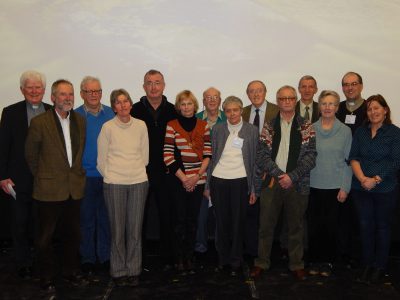 Describing as “crucial” the COP21 climate talks that will take place in Paris in December, Prof Sweeney said he hoped an inclusive global agreement would be made at that event, adding that he believed it was economically affordable to prevent runaway climate change. “A global agreement to halt the rise of greenhouse gas emissions sometime in the next decade is essential to avoid dangerous climate change,” he said. “Limiting climate change will require substantial and sustained reductions in greenhouse gas emissions.”
Describing as “crucial” the COP21 climate talks that will take place in Paris in December, Prof Sweeney said he hoped an inclusive global agreement would be made at that event, adding that he believed it was economically affordable to prevent runaway climate change. “A global agreement to halt the rise of greenhouse gas emissions sometime in the next decade is essential to avoid dangerous climate change,” he said. “Limiting climate change will require substantial and sustained reductions in greenhouse gas emissions.”
Prof Sweeney is currently leading a research programme into the impacts of climate change in Ireland and into the production of climate scenarios for Ireland for mid and end century. As one of the contributing authors and a review editor of the Fourth Assessment Report of the Intergovernmental Panel on Climate Change (IPCC), he shared, with several hundred other climatologists, the 2007 Nobel Peace Prize.
Prof Sweeney concluded by saying, “There’s an unheard voice in the midst of all of this: that is, the voice of our grandchildren asking, ‘What kind of planet are you leaving us?'”
You can see a video of Prof Sweeney’s talk here (use the password ‘catherine’ to view it).
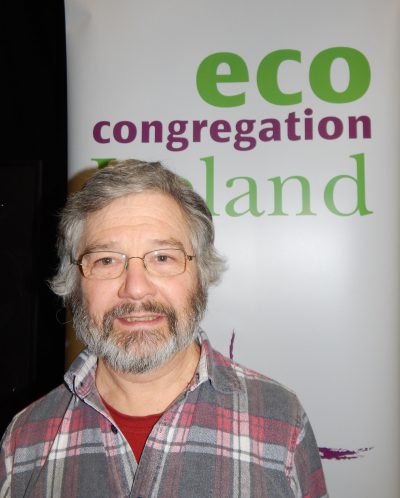 Following his talk, members of two eco-congregations – Kilbride Presbyterian Church, Co Antrim, and the Oblate parishes of Inchicore, Dublin – shared how they have undertaken environmental initiatives in their local communities. You can find out more about Kilbride here and more about Inchicore here.
Following his talk, members of two eco-congregations – Kilbride Presbyterian Church, Co Antrim, and the Oblate parishes of Inchicore, Dublin – shared how they have undertaken environmental initiatives in their local communities. You can find out more about Kilbride here and more about Inchicore here.
Many thanks to Raphoe Justice and Peace Group for co-hosting this event with us. Members of the group prepared the following report on the event:
Are we too complacent? When it comes to Climate Justice, Ireland is one of the worst offenders. Per head of population we contribute more carbon emissions, the driver of Climate Change. In fact we, as just over 4 million, emit more than the poorest 400 million people put together. How many of us knew that?
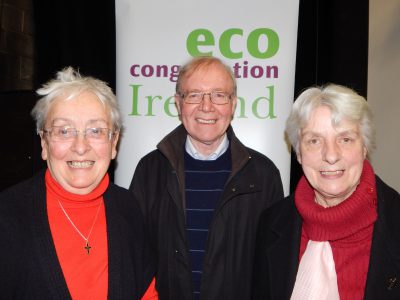 Held in Letterkenny, Co. Donegal, this event was hosted jointly by Eco-Congregation Ireland and Raphoe Justice and Peace group; who also share a link with Trócaire of the GLAS resource. Both organisations, one covering the whole island and one local to Donegal have at their heart a desire to see the population of Ireland and its churches engage with the issue of Climate Justice. Prof John Sweeney, Ireland’s most eminent Climate Change expert, says himself of the evening: “I greatly enjoyed the experience and was particularly pleased to learn of the ‘on the ground’ efforts being made by so many members of the two organisations. They are perhaps the pioneers of this century although they may not be appreciated for some time by the general public.”
Held in Letterkenny, Co. Donegal, this event was hosted jointly by Eco-Congregation Ireland and Raphoe Justice and Peace group; who also share a link with Trócaire of the GLAS resource. Both organisations, one covering the whole island and one local to Donegal have at their heart a desire to see the population of Ireland and its churches engage with the issue of Climate Justice. Prof John Sweeney, Ireland’s most eminent Climate Change expert, says himself of the evening: “I greatly enjoyed the experience and was particularly pleased to learn of the ‘on the ground’ efforts being made by so many members of the two organisations. They are perhaps the pioneers of this century although they may not be appreciated for some time by the general public.”
During his talk Prof Sweeney outlined how carbon levels can now be tracked back 800,000 years and all the evidence points to a major rise in carbon emissions since the industrial revolution, and spiking beyond precedent over the last 50 years. He showed how it is now humans that control the weather for the first time in history, and not the other way around. He talked of the sea level rise and storm surges experienced in Ireland as being already consequences of human-initiated Climate Change. He reminded listeners of the unknown but likely catastrophic consequences if the average climate temperature of the world is allowed to warm more than 2 degrees, which we have but a few years to prevent.
He then showed how Ireland’s climate, especially in the North West, is generally likely to suffer least from Global warming effects. Flooding and increased rainfall is likely to more affect the East and South in winter and drought in summer. This, however, should not make us complacent; with extreme drought, increased flooding, sea level rises and storms increasingly likely for those in the poorest parts of the world, the population of Ireland must stand with the rest of the world in seeking Climate Justice for all. Some small low-lying island nations are already considering the need for relocation as their abode is claimed by the ocean. Migration due to climate catastrophes can only increase: can we provide these multitudes with a home?
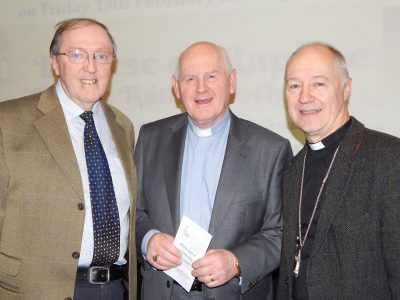 All were encouraged to lobby politicians attending the Climate Summit in Paris in December: that nations would reach agreement to reduce world carbon emissions. He then looked at our failure in Ireland to really take our commitment seriously as we have not met previous obligations. Prof Sweeney criticised the Harvest 2020 programme which seems to ignore any need to reduce our carbon emissions. The future carbon budget for Ireland has been allocated to the agriculture sector, which is being allowed to expand its herd.
All were encouraged to lobby politicians attending the Climate Summit in Paris in December: that nations would reach agreement to reduce world carbon emissions. He then looked at our failure in Ireland to really take our commitment seriously as we have not met previous obligations. Prof Sweeney criticised the Harvest 2020 programme which seems to ignore any need to reduce our carbon emissions. The future carbon budget for Ireland has been allocated to the agriculture sector, which is being allowed to expand its herd.
In questions from the audience of over eighty people, the vulnerability of many of Ireland’s small-hold farmers at the expense of powerful big business was highlighted. Prof Sweeney pointed out the irony of encouraging a strategy of increasing milk production, not because we need more national consumption, but to export milk products to China – a population with demonstrated lactose intolerance in many of its inhabitants. We need to support Ireland’s agricultural sector but in balance with other sectors. To claim that the energy, transport and residential sectors can – and should – be carbon neutral by 2050 to allow agricultural emissions to increase needs to be debated.
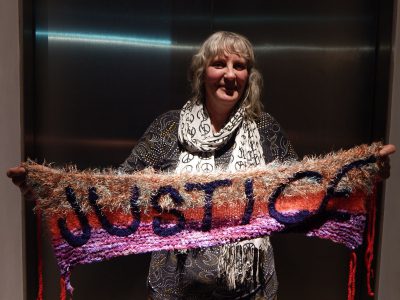 Prof Sweeney concluded his talk saying that the political and administrative appetite to seriously address Ireland’s greenhouse gas emissions is not evident. Hope, however, was offered as Prof Sweeney reminded his audience that Ireland has shown that it can pull together to tackle big issues of national concern. It needs to do so with regards to Climate Change. His last and final point was that political rhetoric which acknowledges the problem needs to be turned into reality in tackling it – and fast – for the clock is ticking!
Prof Sweeney concluded his talk saying that the political and administrative appetite to seriously address Ireland’s greenhouse gas emissions is not evident. Hope, however, was offered as Prof Sweeney reminded his audience that Ireland has shown that it can pull together to tackle big issues of national concern. It needs to do so with regards to Climate Change. His last and final point was that political rhetoric which acknowledges the problem needs to be turned into reality in tackling it – and fast – for the clock is ticking!
The evening ended with two presentations, from Kilbride Presbyterian Church outside Belfast and from the Oblate parishes of Inchicore in Dublin. Both groups shared the practical responses that they were finding as congregations to embrace and tackle these major issues. From recycling schemes and gardening to appreciating the nature around them, many ideas were shared as to how parishes across the island could be Eco-Congregations and face the challenge to our faith and celebrate God’s wonderful, but fragile, creation.
